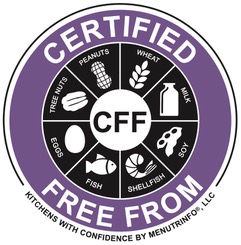It’s hard to go to the grocery store and pick up a jar, bottle or box that doesn’t have an array of certifications on it. More and more, consumers are seeking out third-party verification for claims like gluten-free, non-GMO, organic, and many, many more.
Tons of certifying and labeling companies are setting similar standards and regulations related to how your food is grown, raised, harvested, selected, handled, slaughtered, packaged, and transported. There are dozens of different labels you may spot in the grocery store. Here are a few niche certifications you may want to pay attention to:
Certified Free From

We might be biased on this one, but the Certified Free From (CFF) certification is the first and only of its kind. Established in 2017 as a division of MenuTrinfo, Kitchens with Confidence is an independent certification entity. The CFF audit can be used on kitchens as well as packaged goods to show the absence of allergens.
The CFF audit reviews everything from incoming ingredients to outbound shiping, and everything in-between. Upon successful completion of the audit, kitchens and manufacturers can display the CFF seal as proof of their dedication to safely feeding those with food allergies.
American Grassfed Association

Studies have shown that the nutrient composition of your beef can vary depending on what the cows eat. Grass is the natural diet of a cow, and grass-fed beef contains more vitamins and antioxidants than grain-fed beef does.
“From the farm to the marketplace and in government policy, we [American Grassfed Association] support, advocate, and promote American grass-fed and pasture-based farms and ranches. Maintaining a credible, transparent national standard for animals humanely raised on pasture.”
A few standards set by the AGA require livestock to eat a 100% grass diet, be pasture raised, no use of antibiotics or hormones, and they must be of American family-farm origin.
Salmon Safe

Prominent on the West Coast, Salmon Safe certifies plots of land that may impact the local wildlife. This organization helps these communities restore safe watershed practices. This is done to, “provide high value insight and independent verification for environmental practices protecting water quality and habitat.” Salmon Safe ensures that water run-off from agriculture, developments and other activities is clean and won’t harm surrounding salmon and wildlife populations.
Today, 300 supermarkets feature salmon safe products. 23 land development projects and 17 University campuses have also been accredited in using sustainable practices with their watershed.
Demeter

Demeter is the only available certification company focusing on biodynamic farming. All of these certified products meet the USDA organic standards, but Demeter goes far beyond that. They ensure requirements for fertility, disease, pest and weed control as well as water conservation and biodiversity are met. Demeter emulates the same standards that date back to ancient Greek agricultural practices. This keeps sustainability and diversity at the forefront of their standards and certifications.



